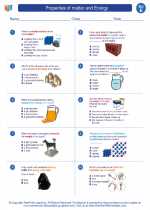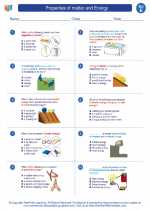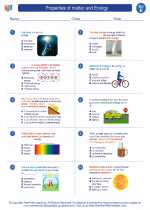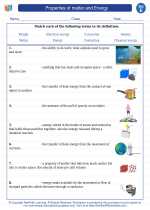Properties of matter and Energy -> natural phenomena
Natural Phenomena
Natural phenomena are observable events that occur in the natural world and are not man-made. These phenomena can be explained through scientific principles and have a wide range of effects on the environment and living organisms. Understanding natural phenomena is important for our knowledge of the world around us and for making informed decisions about our interactions with the natural world.
Types of Natural Phenomena
There are various types of natural phenomena, including:
- Weather phenomena: such as thunderstorms, hurricanes, tornadoes, and rainbows.
- Geological phenomena: such as earthquakes, volcanic eruptions, and tsunamis.
- Astronomical phenomena: such as solar and lunar eclipses, meteor showers, and comets.
- Biological phenomena: such as migration patterns of animals, blooming of flowers, and the changing of seasons.
Studying Natural Phenomena
Studying natural phenomena involves conducting scientific observations, experiments, and data analysis. Here are some key steps and concepts to consider when studying natural phenomena:
Observation and Data Collection
When studying natural phenomena, it is important to carefully observe the phenomenon and collect relevant data. This may involve using scientific instruments, recording measurements, and documenting the characteristics of the phenomenon.
Hypothesis Formulation
Based on the initial observations, scientists can develop hypotheses to explain the natural phenomenon. These hypotheses are educated guesses that can be tested through further experimentation and analysis.
Experimentation
Conducting experiments allows scientists to test their hypotheses and gather additional data. This may involve creating controlled conditions in a laboratory setting or making observations in the natural environment.
Data Analysis
After collecting data from observations and experiments, scientists analyze the data to look for patterns, relationships, and potential causes of the natural phenomenon. This often involves statistical analysis and the use of scientific models.
Conclusion and Communication
Based on the data analysis, scientists draw conclusions about the natural phenomenon and its underlying causes. These conclusions are communicated through scientific publications, presentations, and educational materials to share knowledge with the broader community.
Importance of Understanding Natural Phenomena
Understanding natural phenomena has numerous benefits, including:
- Improving our ability to predict and prepare for natural disasters, such as hurricanes and earthquakes.
- Advancing scientific knowledge and contributing to the development of new technologies and innovations.
- Informing environmental conservation efforts and sustainable resource management.
- Enhancing our appreciation of the natural world and promoting environmental stewardship.
By studying natural phenomena, we can gain a deeper understanding of the world around us and make informed decisions about how we interact with and protect our planet.
.◂Science Worksheets and Study Guides Fifth Grade. Properties of matter and Energy

 Worksheet/Answer key
Worksheet/Answer key
 Worksheet/Answer key
Worksheet/Answer key
 Worksheet/Answer key
Worksheet/Answer key
 Vocabulary/Answer key
Vocabulary/Answer key
 Vocabulary/Answer key
Vocabulary/Answer key
